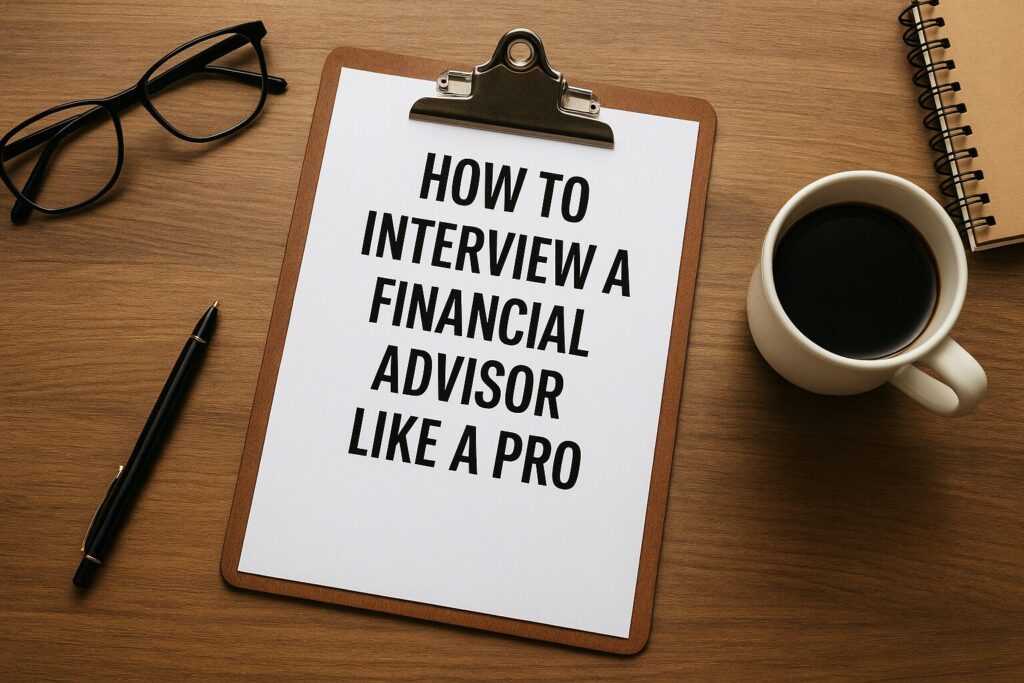
Ask the Right Questions to Find the Right Fit for Your Retirement Goals
Choosing a financial advisor is one of the most important retirement decisions you’ll ever make. This person may guide you through decades of decisions—on income planning, investments, taxes, estate strategies, and more.
But not all financial advisors are created equal.
Some are outstanding fiduciaries who put your best interests first. Others may be more focused on sales than service. That’s why it pays—literally—to interview financial advisors like a pro.
In this post, you’ll learn the key questions to ask, red flags to avoid, and hear from two retirees who took very different approaches—with very different results.
👀 Why It Matters
You’re not just hiring someone to manage your money. You’re choosing a long-term partner to help protect your nest egg, grow your income, and guide you through life’s biggest financial transitions.
So take your time. Be picky. And don’t be afraid to ask tough questions.
📝 What to Ask: 10 Essential Questions for Financial Advisor Interviews
Whether you’re meeting in person or over Zoom, make sure to ask:
- Are you a fiduciary at all times?
A fiduciary is required by law to act in your best interest—not just when it’s convenient. - How are you compensated?
Fee-only? Commission-based? A mix? Get clarity. Fee-only advisors have fewer conflicts of interest. - What services do you offer?
Investment management, tax planning, retirement income planning, estate planning? - Who is your typical client?
Are they experienced with retirees, or more focused on younger accumulators? - What is your investment philosophy?
Conservative? Aggressive? Evidence-based? Do they use individual stocks, funds, annuities? - How often will we meet?
Ask about communication style, frequency of check-ins, and availability for questions. - What credentials do you hold?
Look for designations like CFP® (Certified Financial Planner), CFA®, or RICP®. - Can I see a sample financial plan?
A reputable advisor should be able to show you a sample (with client info redacted). - Do you have any disciplinary history?
You can also check this independently at brokercheck.finra.org. - What happens if something happens to you?
Do they have a succession plan or a team that can step in?
✅ Real-Life Example #1: Jean Found a Pro
Jean, 68, had just sold her business and was overwhelmed by a sudden influx of money. She interviewed three advisorsbefore choosing one.
“I asked each of them about their fiduciary status, how they get paid, and whether they had experience helping clients with business sales and retirement income,” Jean recalls.
She picked a fee-only fiduciary with a conservative investment style and tax expertise. They built a plan that generated safe income from a diversified portfolio and kept her tax bill low.
“Best decision I made in retirement,” Jean says.
🚩 Real-Life Example #2: Bill Got Burned
Bill, 71, met an advisor at a free lunch seminar. He was impressed by the slick presentation and strong promises.
“He told me I’d never lose money again and pitched some annuities with big bonuses,” Bill says.
But Bill didn’t ask about fees, liquidity, or the advisor’s credentials. After signing paperwork, he discovered he was locked into a high-commission annuity with stiff surrender charges for 10 years.
“It wasn’t what I thought I was getting. I wish I’d asked more questions—or gotten a second opinion.”
Bill’s mistake is common—and costly. Always take your time, and never sign anything under pressure.
🧠 Tips for Interviewing Like a Pro
- Treat it like a job interview – Because it is. You’re the employer.
- Interview at least two or three advisors before deciding.
- Bring a list of questions to stay on track.
- Take notes and reflect on how comfortable you felt during the meeting.
- Ask for a plain-English summary of any proposed strategies or products.
- Be wary of jargon, guarantees, or high-pressure tactics.
- Check credentials and complaints on sites like CFP.net and FINRA BrokerCheck.
💬 What to Listen For
- Clear, easy-to-understand explanations
- Transparent discussion of fees and risks
- Willingness to educate, not sell
- Experience with retirement planning
- A calm, thoughtful demeanor—not hype or pressure
🧾 After the Interview: What to Do Next
- Ask for a written proposal or summary of services.
- Ask about the next steps and whether there’s an onboarding fee.
- Request a second meeting if needed—especially if you want to bring a spouse or adult child.
- Trust your instincts. If something feels off, walk away.
🧭 Final Thoughts
Choosing the right financial advisor can help you sleep better at night and feel confident about your retirement future. But the wrong advisor can cost you thousands—or even derail your plans entirely.
So take the time to ask smart questions. Compare your options. And choose someone who listens, explains clearly, and truly acts in your best interest.
You’ve worked hard for your savings. Make sure the person managing it deserves your trust.
Disclaimer: This blog post is for educational purposes only and does not constitute financial, legal, or investment advice. Always do your own due diligence and consult a certified financial planner or advisor before making any decisions regarding your retirement finances.